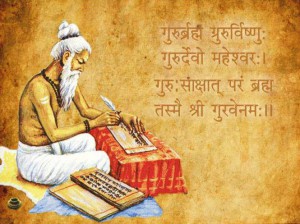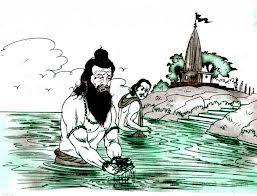Once, a beggar went to a farmer’s house to beg for food. The farmer’s wife was at home, making bread from gram flour. The farmer soon arrived, kissed his children, and after his wife washed his hands and feet, he sat down to eat the bread she had prepared. The farmer’s wife threw a handful of gram flour to the beggar, who gratefully took it and went on his way.
As the beggar walked, he started thinking to himself: “Do I even have a life worth living? I spend my days begging like a dog, and I still have to make my own food. Look at this farmer—what a beautiful home, with a loving wife and children. He grows his own food and enjoys meals with his family. Truly, this farmer is fortunate.”
Meanwhile, as the farmer was eating, he told his wife, “Our blue ox is getting old and is no longer able to work. If we can arrange some money, we might get by this year. I’m going to Sadhoram Mahajan; he’ll lend us some money with interest.”
After eating, the farmer went to Sadhoram Mahajan and, after much pleading, borrowed 1 rupee on interest. Sadhoram counted out the money from his iron safe and handed it to the farmer, who then headed back home.
As the farmer walked home, he began thinking: “Am I really just a man with only 5 rupees at home, and not even that in cash? Look how easily Sadhoram lent me money; he must be so wealthy, with hundreds of rupees at his disposal. If anyone is truly fortunate, it’s Sadhoram.”
Sadhoram was a small-time businessman who bought clothes in bulk from big shops and resold them. The next day, he went to Prithvichand’s shop to buy clothes. As he sat there, he observed many telegrams arriving—some from Bombay, some from Calcutta—some bringing news of profits of 5 lakhs, some of 1 lakh. Sadhoram watched all this while handling clothes, and on his way home, he thought, “Am I just a small-time businessman, making only a couple of hundred rupees, while Prithvichand makes millions in a single day? He is truly fortunate.”
Prithvichand was sitting in his shop when a telegram arrived, informing him of a loss of 5 lakhs. He was deeply worried. A servant then reminded him, “There is a banquet today at Raibahadur Seth’s hosted by the local authority. You must go; the car is ready.”
Prithvichand drove to Raibahadur’s mansion, where golden and silver chairs were set up. The Commissioner and other high-ranking officials were there, shaking hands with Raibahadur. Prithvichand, a prominent businessman, was barely noticed, but he, too, found a seat.
As Lat Saheb arrived, he shook hands with Raibahadur and had tea with him. On his way back in the car, Prithvichand thought, “I am a businessman, and I was so stressed over losing 5 lakhs. Look at Raibahadur; he is so sophisticated, with Lat Saheb himself shaking hands with him. He is truly fortunate.”
After Lat Saheb left, Raibahadur developed a headache. Top doctors were called to his room. Overwhelmed by a series of business losses, Raibahadur became even more anxious. As he looked out the window, he saw the beggar from earlier, walking carefree with a stick in his hand. Raibahadur thought to himself, “This beggar is the truly fortunate one—he doesn’t care about losses or profits, nor does he have to entertain Lat Saheb. He is truly happy.”
Moral of the Story:
The meaning of this story is that we often see others as more fortunate than ourselves. However, true happiness is only known to those who have inner peace. A content monk once said to a king, “O King, you are the master of a vast kingdom, while I am the master of my tattered clothes. Both of us possess something, but true poverty lies in the thirst for more. I am content with my tattered clothes, while you are not satisfied with your great kingdom. Therefore, contentment is not in wealth or status; it is in the peace of mind. If the mind is satisfied, whether you have lakhs of rupees or just a penny, there is joy in both situations.”
This teaches us that those who seek satisfaction only in money are missing the true essence of happiness. Real happiness comes from attaining a connection with God; worldly happiness is fleeting and can be found even without seeking it because it is temporar



